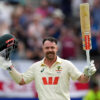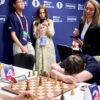Brendon McCullum pointed out that amidst England’s dismal Champions Trophy campaign, there were a few positive takeaways. He highlighted the performance and physical condition of fast bowler Jofra Archer as a major bright spot.
Archer completed his full quota of overs in the first two matches and bowled nine overs in the curtailed game against South Africa. He consistently bowled with good pace, took wickets in each match, and was clearly the best of England’s bowlers, even though South Africa won convincingly.
McCullum noted that Archer has been away from competitive cricket for a couple of years and needed some time to regain his rhythm. However, McCullum believes Archer has performed exceptionally well, bowling at high speed and managing a significant workload. McCullum emphasized that they have seen glimpses of Archer’s brilliance, including his wickets in the recent games.
McCullum stated that having Archer back, fit, and enthusiastic about playing is a significant victory for English cricket, considering Archer’s high caliber as a player.
Archer’s strategic use of the pitch and the new ball was particularly impressive. He dismissed Travis Head early with a caught and bowled, and despite limited swing, maintained tight bowling in his initial spell. Against Afghanistan, he initially bowled short deliveries before changing tactics and taking two wickets in quick succession. Even with Mark Wood injured and defending a small total against South Africa, Archer was the fastest bowler, dismissing both openers, Ryan Rickelton and Tristan Stubbs, early on.
With the Ashes series in mind, Archer’s ability to handle increased workloads raises hopes for his participation. McCullum expressed cautious optimism, emphasizing the need to manage Archer’s workload carefully and consider potential risks. However, McCullum is confident that Archer is eager to play Test cricket and could significantly strengthen the fast bowling unit. McCullum reiterated his satisfaction with Archer’s current condition and his return to playing without injury.
However, these positives are limited. McCullum’s tenure in white-ball cricket has been challenging, with only three wins and eleven losses, including a seven-game losing streak, England’s longest since 2001. Despite McCullum’s earlier optimism about winning the first two games, the heavy defeat to South Africa highlighted the current state of England’s ODI team.
McCullum acknowledged their underperformance and disappointment, stating they had hoped for a strong finish but performed poorly and have considerable work ahead. They plan to strategize improvements for their white-ball cricket to return to expected levels of competitiveness.
With just under three months until their next ODI, McCullum faces a significant rebuilding task, starting with appointing a new captain following Jos Buttler’s resignation due to poor results.
Buttler’s last innings as captain was uncharacteristic of his usual high standards, ending with a dismissal after a slow innings. McCullum reaffirmed Buttler’s importance to the white-ball team and his continued role. He praised Buttler’s brave decision to step down, providing an opportunity to plan the team’s future.
McCullum intends to discuss the captaincy with Rob Key and the ECB to identify the right candidate. They will also analyze the lessons learned from recent tours and tournaments to enhance their competitiveness.











